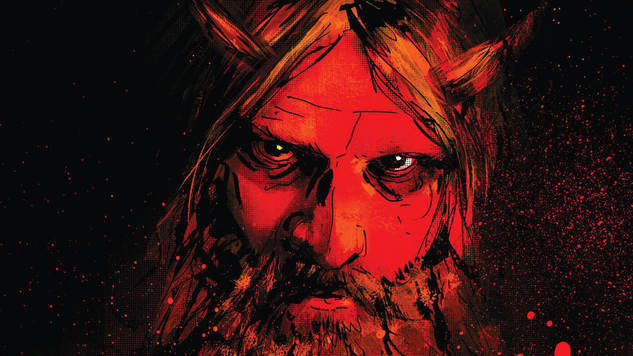Lucifer Writer Dan Watters Dissects the Fragments of Satan
Main Art by Jock
Of the four inaugural Sandman Universe titles, none stands in a longer shadow than Lucifer. Beyond Neil Gaiman’s influential portrayal in the pages of Sandman, beyond Mike Carey and Peter Gross’s expertly constructed solo series, beyond his various DC Comics appearances since, few characters have played such a key role across different media than the devil himself—why, even God typically remains just off camera. Yet over the course of a puzzle-box first issue, Dan Watters, Max Fiumara, Sebastian Fiumara and Dave McCaig (re)introduce a Prince of Lies who is at once comfortingly familiar and undeniably changed from the last time we saw him gallivanting about. This isn’t exactly the Lucifer we know—and the book is all the better for it. Watters, who has spun similarly devilish tales like Limbo and Deep Roots over the last few years, has a wealth of Satanic voices populating his head, and in advance of Lucifer #1, in stores this week, we invited him to break down a few of the most influential Lightbringers leaving their mark on his interpretation of the original fallen angel.
![]()
Lucifer Writer Dan Watters on the Fragments of Satan:

Paradise Lost Art by Gustave Dore
Paradise Lost: Satan
Right, let’s get this one out of the way, shall we? John Milton’s 1667 epic poem is obviously the biggest influence on our iteration of Lucifer if we go back to Sandman—and with very good reason. Milton infused the character with a Romantic nobility, gave an idealism to his defiance and made him simply a hell of a lot of fun compared to the comparably stuffy God who turns up in the poem. In fact, so influential is this poem that it marks the point at which, in popular consciousness, we began to amalgamate the fallen angel Lucifer with Satan, the ruler of Hell. So very possibly the most important make-over the devil’s ever had.
![]()

The Master & Margherita Cover Art via Penguin Random House
The Master & Margherita: Woland
In Mikhail Bulgakov’s 1937 novel, Woland is a mysterious foreign professor knocking around Moscow. Much like our Lucifer, he has an entourage, and seems to enjoy spending his time with witches, demons and—possibly most importantly—a giant machine-gun-wielding housecat named Behemoth (I cannot overstate how much I love this book). Woland is also a catalyst for everything that happens around him; rather than particularly preying on mankind’s weaknesses, he’s simply there for them. I like the idea of viewing the devil as more of a through-thread of human darkness, rather than trying to objectively blame him for it. The latter very much feels like passing the buck, since we’re perfectly capable of damning ourselves, thank you very much.
![]()
-

-

-

-

-

-

-

-

-

-

-

-

-

-

-

-

-

-

-

-

-

-

-

-

-

-

-

-

-

-

-

-

-

-

-

-

-

-

-

-

















































